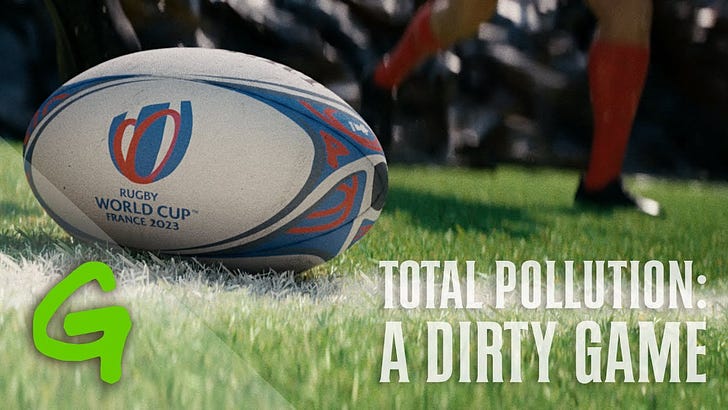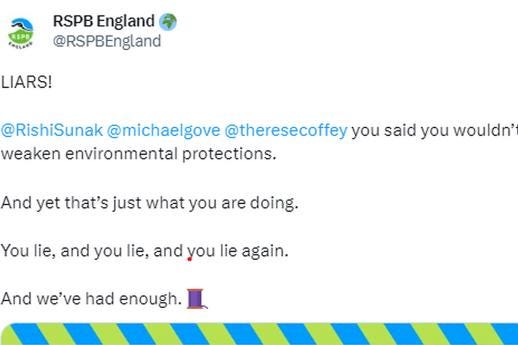Borkowski Media Trends: Greenpeace vs Big Oil at RWC, Trump Mugshot, RSPB vs UK Government & More...
PLUS: That's Amore for Kanye? | Ed Sheeran x Starbucks 'Blandwashing'
Greenpeace vs Big Oil at the Rugby World Cup: Mark Borkowski on The Future of Activism
Greenpeace's recent return to the fight against Big Oil has sparked a significant reaction, with their viral film, "Total Pollution: A Dirty Game," making waves. The video shows a packed rugby stadium drowning in oil as the kickoff whistle blows, protesting Total Energy Corp sponsorship of the Rugby World Cup.
This creative approach aims to draw attention to the issue of greenwashing, similar to how human rights groups challenged the FIFA World Cup last year. While these protesters align ideologically with "Just Stop Oil," their tactics appear more polished and less disruptive, at least in the literal sense, often overused in advertising jargon. But are these methods more effective?
Recent research delves into how millennials and Gen Z participate in environmental protests. These generations display heightened passion, awareness, and concern for the climate crisis. Their approach to activism and protest has evolved compared to previous generations.
Growing up with digital tools and social media, millennials and Gen Z use these platforms to connect with like-minded individuals worldwide. Connected activism, including hashtag campaigns, online petitions, and virtual protests, has become a potent aspect of environmental advocacy. They emphasize the intersectionality of environmental issues with social justice and equity concerns, advocating for holistic solutions.
The younger generation has also introduced fresh perspectives and strategies to environmental protests. They employ art, music, and creative expressions to engage and mobilize their peers and the public, influencing which actions make headlines. Thus, the foundation laid by previous generations of environmental activists now seems tired.
Many of my Boomer contemporaries fail to comprehend the zealousness of a beleaguered generation. However, there's a realization that playing nice can only achieve so much. Many older generations need to grasp the urgency felt by today's youth, who frame climate action as a moral imperative due to potential long-term consequences.
This sense of urgency has driven "terminally online" Millennials and Gen Z from the digital realm to the streets, revitalizing old-school direct action. Surprisingly, the traditional activism institutions have not effectively harnessed this creativity for in-person direct action, resulting in the same old outcomes: public outrage and an advantage for the establishment.
Perhaps traditional NGOs, rooted in process and scale, have forgotten their origins. To rejuvenate, they must be unafraid to tear up the old creative rulebook, unburdened by the fears that come with age and experience.
Trump’s Mugshot Mayhem
A few things are universally agreeable about Donald Trump: he splits opinion and is one of the world’s funniest people. Whether it’s trying to pay a lawyer he owed $2m with a deed to a horse, asking a seven-year-old girl whether she “still” believed in Santa Claus or calling Stormy Daniels "Horseface" (appears to be an equine-themed pattern), he is undeniably funny.
And it's truly a sign of the times that Trump became the first US president last week to have a mug shot taken after he was arrested and booked on criminal charges, yet still managed to come out the other side with his reputation intact. He can thank his divisive character and his comic genius. Because ultimately, the mug shot is really funny.
Since the release of Trump's mug shot, his campaign has skilfully capitalised on the moment, generating a whopping $7.1 million from related merch, marking the incident as a cultural phenomenon and a fundraising masterstroke.
The severity of the situation is now totally lost due to the vast influx of memes coming from a picture that would ruin 99% of the world's reputation. It defies any logic or basic principles of crisis and reputation management. Trump's ability to become the meme that takes over the news agenda and a damaging viral news story is almost a superpower.
Whether you view him as a masterful media manipulator or a byproduct of our sensationalist age, there’s no denying his unique imprint on the era. As history books recount his presidency and subsequent events, they will also have to account for the virtual world's embrace, and at times, mockery, of a figure who knew all too well how to stay at the forefront of the digital dialogue.
RSPB’s Tweet Ruffles Feathers
Feathers were ruffled this week on the social platform formerly known as Twitter when the RSPB, a charity with an otherwise cuddly reputation, labelled the Prime Minister, Michael Gove and Therese Coffey “LIARS!”. The tweet was made in reaction to the government’s decision to scrap Natural England rules that currently prevent new developments in 62 local authorities unless builders can demonstrate they are “nutrient neutral.” The move is the most recent in Rishi Sunak’s pre-election push to prove that he is NOT a tree hugger.
Despite initially standing by its choice words, by Thursday morning the RSPB had committed that all too oft repeated PR blunder and backtracked on its statement. Appearing on BBC Radio 4’s Today programme like all good recalcitrant public figures, Beccy Speight admitted that the charity had become “frustrated” with government actions but that it was wrong to target “individual people” instead of the policy itself. She then acknowledged that she had not seen the tweet before it was issued as it had not gone through “normal protocols.” Whether those “normal protocols” involve chief executive sign off of every social media post was not discussed.
So why the kerfuffle? After all, guidance from the Charity Commission does not ban political campaigning, as long as any political involvement is balanced. Once would presume that legislative back tracking affecting British wildlife would attract ire from the RSPB, no matter which party was in government. The RSPB website continues to run a headline stating “Removing protection of our rivers and water courses would be a national scandal,” hardly neutral language. And while this particular debacle might have been a headache for the RSPB press office, one might even say that the media flurry over a single word has brought more valuable attention to the government’s U turn on environmental policies during a universally acknowledged climate crisis than a flock of orange clad Just Stop Oil luvvies ever could. This Trend writer’s unsolicited advice to the RSPB? Sharpen your beaks.
That’s Amore…Kanye believe it?
Kanye West and Bianca Censori’s Italian holiday has been entertaining tabloid readers and infuriating many Italians in recent weeks, from barefoot city strolls (Kanye) to public near-nudity (Bianca). But it all reached fever pitch this week with publication of photos of the couple ostensibly engaging in a NSFW act on a boat in Venice. Many of the headlines were dedicated to snaps of Kanye’s naked bum.
Back in mid-August, when the Italian controversy consisted of Kanye walking around bare-footed, bedraggled and hand-in-hand with his wife dressed in an entirely sheer outfit, an ex-employee of Kanye’s claimed that the whole thing was part of a wider PR stunt. The ex-employee suggested that the next time Kanye is spotted wearing shoes, they will be of his own design. Watch this space.
It’s widely known that Kanye has bipolar disorder, and many have suggested that his past “antics” – from Twitter antisemitism to presidential campaign – were indicative of him being in the throws of a manic episode. With this in mind, we must ask ourselves whether our fixation and public mockery of his “bizarre” behaviour is unethical or exploitative.
But what if we’re the ones being exploited in this scenario? We’ve been paying closer attention to Kanye than since his ‘defcon 4’ tweet, and it may be no coincidence that he is confirmed to be releasing new music imminently. The public may be doing exactly what he wants us to.
Oscar Levant famously said, “There’s a fine line between genius and insanity. I have erased this line.” Perhaps we could say the same of Kanye when it comes to his ability to be a living, breathing publicity stunt. Kanye having a manic episode and conducting an extended PR stunt to drum up interest in his new music aren’t mutually exclusive.
The impulsivity and inhibition suggested by his Italian displays is consistent with the symptoms of a manic episode. But it’s also true that, thanks to this behaviour, Kanye West will be front and mind for many people when his music is released.
Starbucks x Ed Sheeran: A new low in consumerist ‘Blandwashing’
“The greatest trick the Devil ever pulled was convincing the world he didn’t exist”. Yesterday viewers of NBC’s morning flagship Today were subjected to a brand-celebrity collaboration of pure, unfettered evil, but proffered so brazenly that its hatefulness might be allowed to slip into the public bloodstream without unleashing the righteous outrage it richly deserves.
Ed Sheeran, perhaps the world’s most milquetoast megastar, has been attempting to reclaim something of his chummy everyman shtick by performatively doing odd jobs throughout his USA tour.
So far, so inoffensively boring, until Ed ‘The Not-So-Secret Millionaire’ had the GAUL to pop up on US national news boldly parading his latest work experience shilling coffee…for Starbucks.
That’s right. People’s champion Ed Sheeran’s normcore cosplay has transmogrified -directly or indirectly- into taking the price-gouging, tax-dodging, union-busting, landfill-obliterating, Pride-decoration-banning Dime of America’s nightmarish, ultra-consumerist darling.
For Starbucks it makes total sense. The most benign and faceless global superstar on the planet endorsing your terrible brand is near-perfect ‘Blandwashing’. Starbucks simply appearing so devoid of imagination that Ed Sheeran is their idea of an A-List brand ambassador is in some ways a masterstroke. The average consumer will think that any company thus lacking in original thought must also lack the wherewithal to commit constant corporate atrocities in the name of profit.
And perhaps Ed is the other side of the same coin. Maybe he is so generic and engineered for mass consumption that his fans won’t care that he’s grubbing for one of the Western World’s most stereotypically problematic corporate machines. Maybe the maxim that public figures must either be saints or zealots to avoid cancellation does not apply to a personal brand as luridly beige as Ed Sheeran. Maybe Ed Sheeran is the Starbucks of pop stars.




